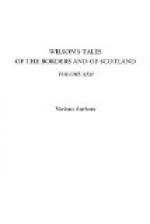THE BURGHER’S TALES.
THE ANCIENT BUREAU.
The sources of legends are not often found in old sermons; and yet it will be admitted that there are few remarkable events in man’s history, which, if inquired into, will not be found to embrace the elements of very impressive pulpit discourses. Even in cases which seem to disprove a special, if not a general Providence, there will always be found in the account between earth and heaven some “desperate debt,” mayhap an “accommodation bill,” which justifies the ways of God to man. It may even be said that the fact of our being generally able to find that item is a proof of the wonderful adaptability of Christianity to the fortunes and hopes of our race. That ministers avoid the special topics of peculiar destinies, may easily be accounted for otherwise than by supposing that they cannot explain them so as to vindicate God’s justice; but if ever there was a case where that difficulty would seem to the eye of mere reason to culminate in impossibility, it is that which I have gleaned from a veritable pulpit lecture. I have the sermon in my possession, but from the want of the title-page, I am unable to ascertain the author. The date at the end is 1793, and the text is, “Inscrutable are his judgments.”
Inscrutable indeed in the case to which the words were applied—no other than an instance of death by starvation, which occurred in Edinburgh in the year we have just mentioned. In that retreat of poverty called Middleton’s Entry, which joins the dark street called the Potterrow, and Bristo Street, the inhabitants were roused into surprise, if not a feeling approaching to horror, by the discovery that a woman, who had lived for a period of fifteen years in a solitary room at the top of one of the tenements, had been found in bed dead. A doctor was called,




